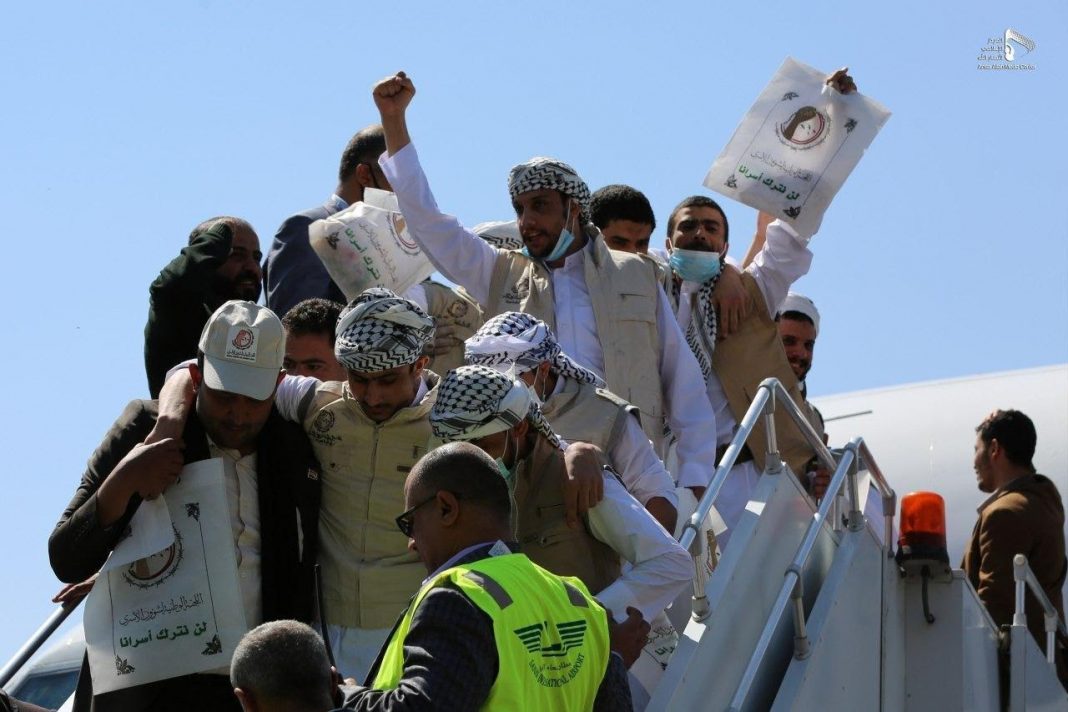SANA’A, YEMEN — “Lak Al Hamd Ya Allah.” These words, which translate roughly from Arabic into “All thanks be to God,” were the first uttered by a 60-year-old Yemeni mother upon seeing her son for the first time in five years. The tearful reunion took place in Yemen’s Sana’a International Airport on Wednesday after the young man was released from Saudi Arabia’s notorious Khamis Mushait military prison near the Yemen-Saudi border. She was among hundreds of mothers, wives, and children reunited with loved-ones after a hard-won prisoner exchange between the Houthis (Ansar Allah) on one side and Saudi Arabia and the United States on the other.
In a reception replete with pomp and ceremony, freed prisoners were greeted by a number of Ansar Allah officials, ministers, members of Parliament as well as military leaders and social figures amid patriotic music and folk dances.
The surprise prisoner exchange is the largest to have taken place since the war erupted in 2015 and was overseen by the International Committee of the Red Cross. It would likely have never taken place had American prisoners not been involved. ”If there were no American prisoners, we would not have seen our families again,” one fisherman freed in the release told MintPress.
According to the Red Cross, some 1,081 prisoners from all sides were released as a part of an UN-brokered peace deal struck quietly in Switzerland last month. The UN envoy to Yemen, Martin Griffiths, said in a briefing to the UN Security Council on Thursday that the prisoner exchange offers a glimmer of hope for Yemen, adding that it may be the largest operation of its kind in history.

Freed Houthi fighters are helped off of a plane at Sana’a International Airport, October, 14 2020. Photo | AMC
Saudi Arabia and its local allies reportedly released 710 Yemeni soldiers and abducted expatriates in the deal in exchange for 3 Americans, one of them deceased, 15 Saudi troops, 4 Sudanese soldiers, and 400 Saudi-backed Yemeni militants.
Kash Patel, the Deputy Assistant to Donald Trump, identified the freed U.S. nationals as Sandra Loli and Mikael Gidada. Loli claimed to be an aid worker conducting humanitarian work in Yemen and Gidada said he was an American businessman conducting business in the country when he was detained by the Houthis. The remains of Bilal Fateen, the third U.S. captive who died during clashes with Houthi fighters, were transported to Oman. The Houthis claim that they have documents proving that the American detainees were arrested conducting intelligence activity on behalf of the United States and Saudi-led coalition.
U.S. National Security Adviser Robert O’Brien said in a statement on Wednesday that “the United States welcomes the release today of U.S. citizens Sandra Loli and Mikael Gidada from Houthi custody in Yemen. He added, “We send our condolences to the family of Bilal Fateen, whose remains will be repatriated as well.”
Abdul Qader Al-Murtaza, chairman of the Houthi-run Committee for Prisoners’ Affairs, said that 250 prisoners were freed from Saudi prisons and 220 from prisons in Marib province on Thursday, in four separate batches. Al-Murtaza said that 680 prisoners were originally supposed to have been released into Houthi custody but the “coalition excluded tens [of] prisoners from the prisons of Marib province, which prompted us to exclude prisoners.”
The oil-rich Marib province has been the scene of fierce fighting between the Houthis and the Saudi-led coalition. Houthi spokesman Brigadier General Yahya Saree revealed on Thursday that Saudi Arabia was concerned about the Houthi advance in Marib, making the Kingdom eager to negotiate.
Another October surprise
Speaking on behalf of the Trump administration, Patel said that the released Houthis did not pose a major threat to Saudi security interests, adding that the individuals were not on any terrorism watch lists. He also said that an undisclosed number of “high-risk” fighters were blocked from release.
According to a senior Hothi official who spoke to MintPress on the condition of anonymity, “The deal was initially discussed at the start of 2020 by an Omani broker, but the American administration postponed the exchange until today to use it as leverage in the coming presidential election.” The exchange took place less than three weeks before the start of the U.S. election.
According to a senior Hothi official who spoke to MintPress on the condition of anonymity, “The deal was initially discussed at the start of 2020 by an Omani broker, but the American administration postponed the exchange until today to use it as leverage in the coming presidential election.” The exchange took place less than three weeks before the U.S. election season kicks off.
Despite what appears to many Yemenis to have been little more than a political stunt, Houthis officials remained positive about the move, confirming that they are open to other deals with the United States to end the war in Yemen. Mohammed AbdulSalam, the spokesman for the movement, said in the wake of the deal, “These steps restore hope in building peace. We have made offers to implement such a step, and we expect it to be positively reflected in the political file.” He claimed the release of Saudi and Sudanese prisoners was aimed at encouraging the other side to move towards peace. “We made a major concession in this regard.”
Feature photo | US citizens, Sandra Loli, right, and Mikael Gidada, left, are pictured in Muscat, Oman on October 14, 2020 after being released from Houthi custody back to the United States as part of a massive prisoner exchange.
Ahmed AbdulKareem is a Yemeni journalist. He covers the war in Yemen for MintPress News as well as local Yemeni media.
The post Questions Surround Timing and Details of Trump’s Recent Yemen Prisoner Exchange appeared first on MintPress News.




